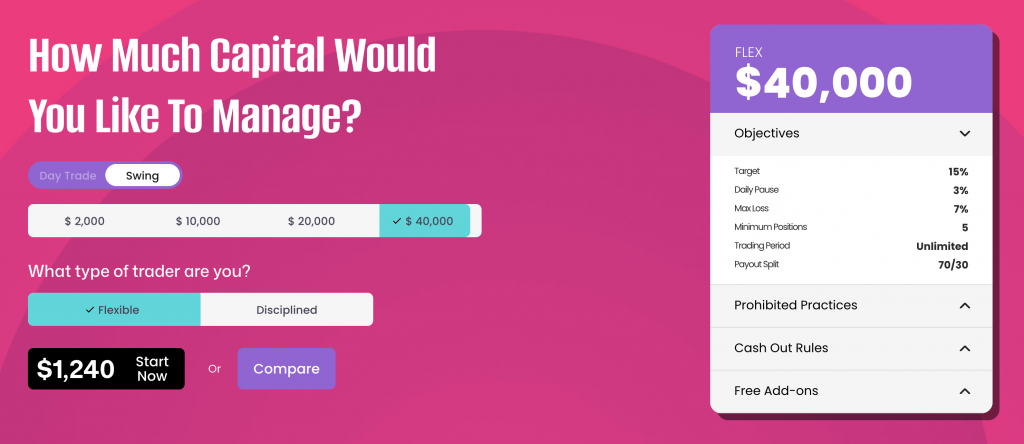Best Prop Firms For Swing Trading [2025]

Swing trading is not the same as day trading. You’re holding positions for days or sometimes weeks. That means when you trade with a prop firm, you want rules, funding, and tools that are specifically tailored to swing trading.
In this guide, our trading experts break down the main points you should check before joining any swing trading prop firm.
What Is A Swing Trading Prop Firm?
A prop firm (short for ‘proprietary trading firm’) gives you access to its capital. In return, you must follow the firm’s rules and usually share profits.
A swing trading prop firm is a prop firm that caters to swing traders, with rules and funding structures tailored to their needs. That means you can hold positions longer than a single session, sometimes over days or weeks.
This differs from day trading prop firms, which often require quick in-and-out trades. Swing traders require more flexible rules—such as overnight holding, static drawdowns, and fair treatment of weekend risk.
Trading Hours & Holding Rules
Most prop firms design their rules for day traders. That’s a problem if you’re a swing trader. Many firms don’t let you hold overnight or over weekends.
Example scenario: Let’s say you buy a stock on Wednesday, expecting earnings results the following week. If the firm forces you to close by Friday, you can’t run your plan.
What to check:
- Can you hold overnight positions?
- Can you hold over the weekends?
- Are there time limits on trades?
If the answer is no, it’s not a fit for swing trading.

Trade The Pool has clear guidelines for swing trading
Instruments You Can Trade
Swing traders don’t need hundreds of markets. But you do need access to the ones that make sense for holding.
Many swing traders prefer forex majors, gold, or stock indices. These markets tend to trend well over several days or weeks.
What to check:
- Which markets are allowed?
- Is there enough variety to build your style?
- Are there any restrictions on lot size or position size?
Leverage & Margin
Swing trades need room to breathe. Unlike day trades, you’re not chasing a few pips. You might sit through bigger swings before the move goes your way.
That means you don’t always need the highest leverage. But you do need reasonable margin rules.
What to check:
- Is leverage fixed, or does it change with account size?
- Does the margin increase on weekends? Some firms tighten rules.
- How does leverage apply across markets (forex vs indices vs stocks)?
Example scenario: If you take a EUR/USD position with a wide stop, you may want a smaller size. Too little margin means you can’t even place the trade.
Drawdown Rules
This is one of the biggest traps for swing traders with prop firms. Many firms set trailing drawdowns. That means if you’re in profit, your maximum loss moves up with it.
Example scenario: You start with $100k and grow it to $105k. If the firm uses a trailing drawdown that locks at $102k, a normal swing trade pullback could knock you out, even though you’re still profitable overall.
What to check:
- Is the drawdown a static (fixed dollar amount) or a trailing one?
- How is it calculated (balance-based or equity-based)?
- Does floating profit lock the drawdown higher?
I’ve found that swing trading with a prop firm requires balancing patience with discipline. The setups still work, but you also have to respect the firm’s rules. It’s not as free as trading your own account, but the extra capital makes it worthwhile to adjust.
News & Event Rules
Swing traders often hold positions through news. That’s part of the strategy. However, many prop firms ban trading around major events, such as FOMC, NFP, or company earnings.
Example scenario: If you hold gold ahead of a Fed rate decision and your firm bans it, you risk violating the rules.
What to check:
- Can you hold through economic news?
- Are there any bans on holding equities during earnings?
- Do they close your positions automatically if you break the rule?
Ensure the news rules don’t hinder your trading style.
Evaluation Vs Instant Funding
Most prop firms require you to pass an evaluation before giving you live funds. That usually means meeting profit targets without breaking rules.
For swing traders, this can be tricky. Evaluations often have time limits. If you’re waiting on setups, you may run out of time.
What to check:
- Is there a time limit to hit the target?
- Is instant funding an option (no evaluation)?
- How high is the profit target compared to your swing style?
Example scenario: A 10% target in 30 days may push you to overtrade. A swing trader might prefer slower, steadier growth.
Platform & Data Access
Swing traders rely on clean charts and reliable data. You need a platform that doesn’t freeze or limit your ability to hold trades.
What to check:
- Which trading platform is supported (MT4, MT5, cTrader, TradingView)?
- Is the data feed stable for multi-day trades?
- Can you use custom indicators if needed?
Scaling Plans
Many prop firms offer scaling. If you trade well, they increase your capital. For swing traders, this is important because larger positions often move more slowly but steadily.
What to check:
- How often do they scale accounts (monthly, quarterly)?
- What profit percentage do you need to qualify?
- Do scaling rules change leverage or margin?
Growing from $100k to $200k means you can diversify across more pairs or indices. That fits swing trading well.
Fees & Costs
Funding isn’t free. Most prop firms charge upfront or monthly fees. For swing traders, you may also face swap or overnight fees depending on the market.
What to check:
- Is the fee one-time or recurring?
- Are there hidden costs for holding overnight?
- Do they charge platform fees?
Final Thoughts
Choosing the best prop firm for swing trading isn’t about hype. It’s about matching the firm’s rules to your style.
Look closely at holding rules, drawdowns, and news restrictions. Check the evaluation process and time limits. Ensure the platform and costs align with your needs.
The right firm should give you space to run trades for days or weeks without breaking rules. If it feels like you’re being forced into day trading, it’s not the right fit.
